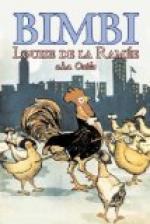“Next time you want a caterpillar taken away, he may eat you for me!” said the blackbird, and flew off in a huff.
She was very ungrateful to hate the black-bird so, for he had been most useful to her in doing to death all the larvae of worms and beetles and caterpillars and other destroyers which were laid treacherously within her leaves. The good blackbird, with many another feathered friend, was forever at work in some good deed of the kind, and all the good, grateful flowers loved him and his race. But to this terribly proud and discontented Rosa Damascena he had been a bore, a common creature, a nuisance, a monster—any one of these things by turns, and sometimes all of them altogether. She used to long for the cat to get him.
“You ought to be such a happy rose!” the merle had said to her, one day. “There is no rose so strong and healthy as you are, except the briers.”
And from that day she had hated him. The idea of naming those hedgerow brier roses in the same breath with her!
You would have seen in that moment of her rage a very funny sight had you been there; nothing less funny than a rose tree trying to box a blackbird’s ears!
But, to be sure, you would only have thought the wind was blowing about the rose, so you would have seen nothing really of the drollery of it all, which was not droll at all to Rosa Damascena, for a wound in one’s vanity is as long healing as a wound from a conical bullet in one’s body. The blackbird had not gone near her after that, nor any of his relations and friends, and she had had a great many shooting and flying pains for months together, in consequence of aphides’ eggs having been laid inside her stem— eggs of which the birds would have eased her long before if they had not been driven away by her haughty rage.
However, she had been almost glad to have some ailment. She had called it aneurism, and believed it made her look refined and interesting. If it would only have made her pale! But it had not done that: she had remained of the richest rose color.
When the winter had passed and the summer had come round again, the grafting had done its work: she was really a Rosa Indica, and timidly put forth the first blossom in her new estate. It was a small, rather puny yellowish thing, not to be compared to her own natural red clusters, but she thought it far finer.
Scarcely had it been put forth by her than the gardener whipped it off with his knife, and bore it away in proof of his success in such transmogrifications.
She had never felt the knife before, when she had been only Rosa Damascena: it hurt her very much, and her heart bled.
“Il faut souffrir pour etre belle,” said the Banksiae in a good-natured effort at consolation. She was not going to answer them, and she made believe that her tears were only dew, though it was high noon and all the dewdrops had been drunk by the sun, who by noontime gets tired of climbing and grows thirsty.




